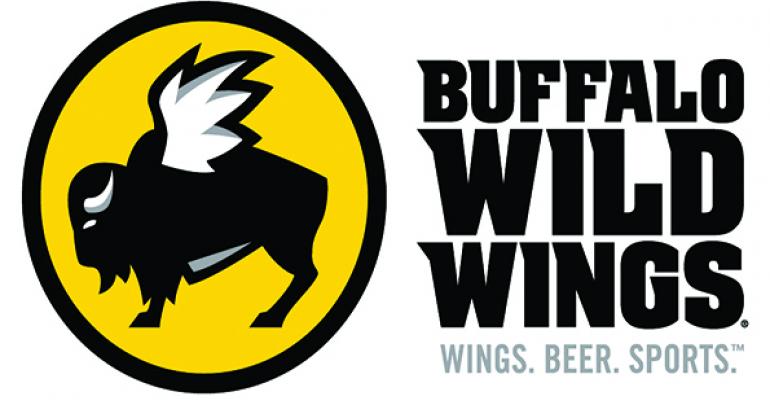Buffalo Wild Wings wants to take the swing out of wings.
The 1,000-unit, Minneapolis-based chicken wing chain, coming off a quarter in which its chicken wing prices rose 16 percent, is looking to ease that volatility in coming quarters.
Company executives said on their fourth quarter conference call Thursday that they have entered into a new contract for two-thirds of their traditional chicken wings. The contract starts in April, and should reduce the company’s exposure to historically high wing prices, but also historically low prices.
"We want to mitigate the impact of being out of the normal range for wings,” CFO Mary Twinem said on the company’s earnings call. The agreements, she said, “will be in place in April and effectively narrow the range of cost per pound that we will pay when traditional wings are at historically high and low market prices.”
The company paid $1.90 per pound for chicken wings in the quarter ending Dec. 28, up 26 cents from a year ago when that price was $1.64. That price led to an 80 basis point increase in the cost of sales, to 30.6 percent of revenues in the quarter from 29.8 percent a year ago.
Chicken wing prices in recent years have swung from extraordinary highs to historic lows amid fluctuations in the supply of chicken wings and changes in the price of poultry. And while lows such as those that Buffalo Wild Wings enjoyed a year ago worked to the company’s profitable benefit, their inevitable swings in the other direction cause profit headaches — higher food costs helped contribute to a 2.4-percent decline in earnings in the fourth quarter, the company said.
Chicken wing prices weren’t the only problem for Buffalo Wild Wings in the fourth quarter. Labor costs caused issues, too, as the company added restaurants in higher-wage states and added labor at its restaurants to improve service.
But investors blew those problems off Friday. The company’s stock rose 7 percent in morning trading, nearing the chain’s all-time high at about $192 a share — mostly because executives said that the company’s same-store sales were up 11.9 percent at company-owned locations in the first five weeks of the quarter.
By comparison, Buffalo Wild Wings’ same-store sales rose 4.8 percent at company locations in the same period a year earlier. On a two-year basis, therefore, Buffalo Wild Wings’ same-store sales are up more than 17 percent.
The company said that it sold 11 million chicken wings during the Super Bowl and also had strong sales during the college bowl season, which included a playoff for the first time — adding a big bowl game to the long list of January bowl games.
One of those bowl games also included the Buffalo Wild Wings-sponsored Citrus Bowl.
Christopher O’Cull, analyst at KeyBanc Capital Markets, said in a note today that he does not consider those sporting events to be “unusual” sales drivers, “given most sporting leagues are focused on growth and Buffalo Wild Wings has been increasing its promotional and marketing tie-ins with these leagues.”
The company increased prices in November by 3.4 percent, and that affected sales, but customers kept coming in. “We’re executing very well in our restaurants right now,” Chief Operating Officer James Schmidt said.
Buffalo Wild Wings in November said that it has hired a new ad agency, TBWA\Chiat\Day, that will start a new campaign during the NCAA basketball tournament, with new ads for each round, executives said.
Meanwhile, executives said the company has added tabletop tablets in 70 percent of its locations. It is now testing tablet menu ordering in two major markets with plans to implement that plan into company owned markets by the end of the year — though executives said it’s still early in the tests to determine how that plan is going.
Smith also said the company is working to increase lunch sales in 2015 with a national lunch program “that highlights what guests want at lunch — variety, value and speed.” She said the company is working to drive traffic at lunch while optimizing speed of service in the kitchen.
Another thing the company could do: Buy other brands. Buffalo Wild Wings has been buying franchisee units as well as investing in or purchasing growth concepts, like Pizza Rev in 2013 and Rusty Taco in 2014. The company had $112.9 million in cash at the end of the quarter.
The company, said Twinem, “will be strategic in franchisee acquisitions and emerging brand investments.”
Contact Jonathan Maze at [email protected]
Follow him on Twitter: @jonathanmaze





